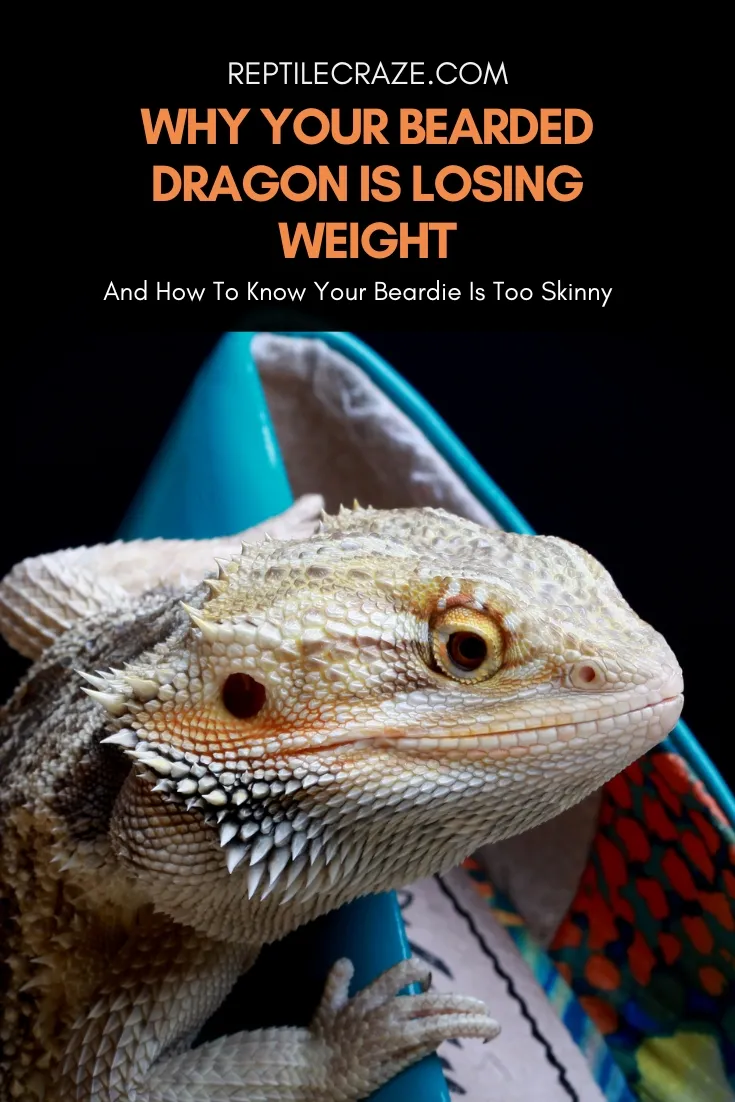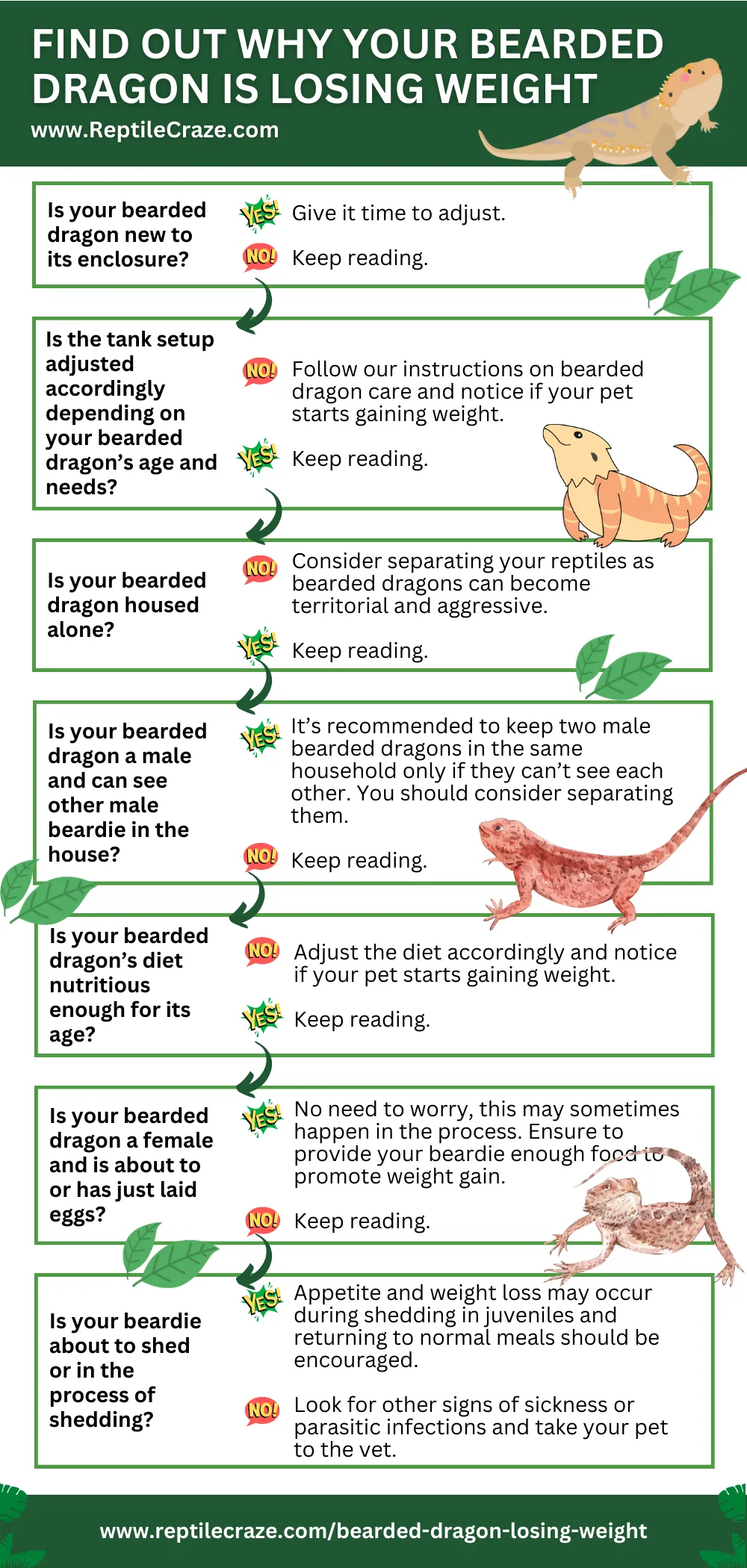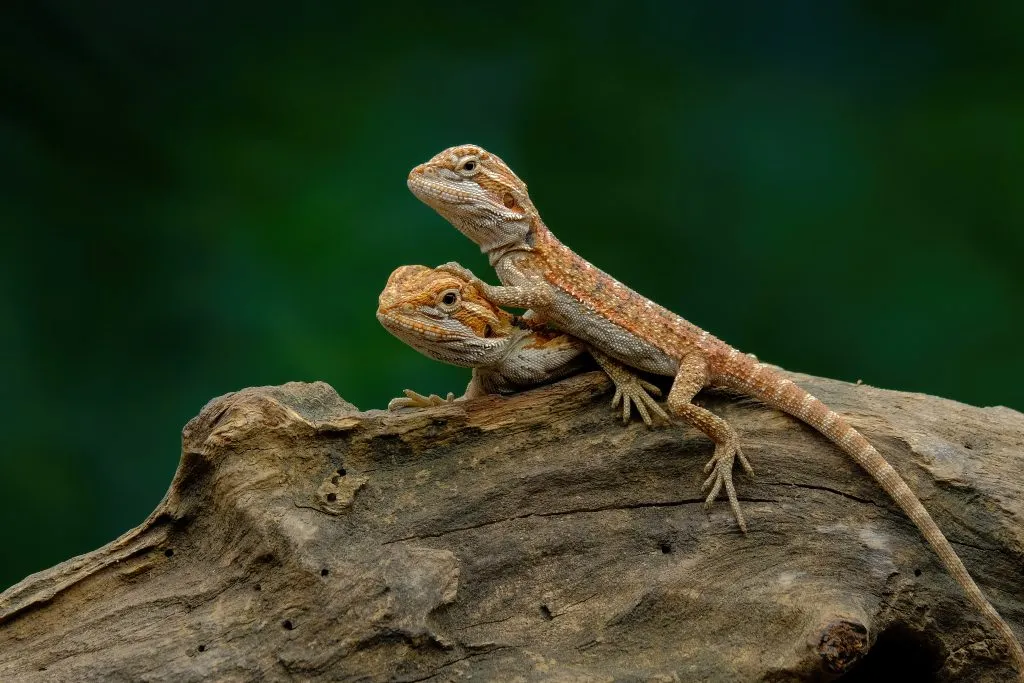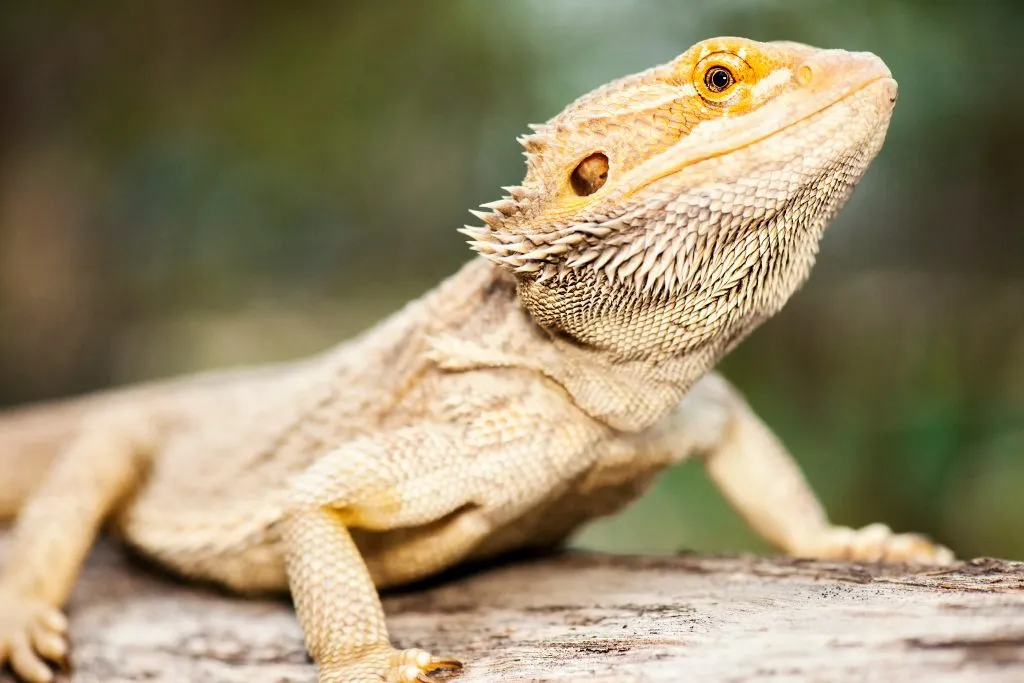
Watching our pets suffering, not eating, and losing weight is unbearable. Practicing and constantly improving our observation skills is the best way to understand their behavior and notice what causes them to lose weight.
Weight loss in bearded dragons is commonly linked to stressful environments or situations like suboptimal conditions, social aggressivity, and decoration changes. Other causes include an inadequate diet, shedding, egg laying, as well as parasitic infections, and other diseases.
Understanding what stands behind your beardie’s condition is the first step in helping it. If weight loss can be associated with aspects you can change yourself, the better. If not, it’s best to see a vet right away. Today we’ll help you identify the best solution for you.
Table of Contents
8 Reasons Why Your Bearded Dragon Is Losing Weight
Veterinarians suggest that a sudden weight drop over the course of a week is enough to indicate that something’s wrong. Needless to say, juveniles shouldn’t lose weight at all, considering how fast they’re growing.
So what exactly stands behind your lizard’s weight loss? Have a look at our infographic below. After that, we will explain everything in detail!

Remember that if you’re unsure what’s causing this, you should seek veterinary advice.
1. Your Beardie Is New to its Enclosure
If your beardie is still young or new to its home, it’s only natural that it’s stressed. As a consequence, it might refuse to eat and lose some weight while getting used to the
Make sure to do everything you can to help your pet feel safe in its new habitat by offering proper
Remember that changing the decor inside your lizard’s
Tip: It’s recommended to keep juvenile bearded dragons in smaller tanks, as this will make them feel safe and increase their appetite if weight loss is caused by stress associated with their enclosures.
On the other hand, if an adult beardie lives in a small
tank , it might be stressed and unable to grow to its full size.
2. Inadequate Diet
An inadequate diet can also cause your bearded dragon to lose weight. This is only natural, as the “science” of feeding these reptiles is very tricky and requires thorough research.
It’s of utmost importance to adjust their diet depending on their age and size.
Juveniles, for example, need much more
If juveniles don’t receive the required
food intake, they won’t develop accordingly and will start losing weight, especially if the inadequate diet is accompanied by suboptimaltank conditions.
Adults can go longer without
Still, if they’re constantly fed products that do not cover their nutritious needs, adults, and juveniles alike, won’t thrive and will develop additional health issues besides weight loss.
3. Suboptimal Tank Conditions
Ensuring your bearded dragon lives in a
Anything that goes against their needs or any slight change in their environment can make them feel uncomfortable, unsafe, and stressed. Naturally, it will lead to weight loss and possibly even diseases.
For example, since your bearded dragon is a cold-blooded animal, it requires a correct lighting and heating setup that aids thermoregulation, keeps it healthy, and facilitates digestion.
If the setup is incorrect, your pet will not be able to thrive. Moreover, it will suffer from indigestion, loss of appetite, and eventually weight loss.
As such, if you suspect that something might be wrong with your beardie’s enclosure, answer these questions:
- Does your bearded dragon receive plenty of bright white light during the day?
- Does your bearded dragon receive enough UVB light? You can use a solarmeter to measure the UV index – the UV index gradient for your pet should be between 0 (far from the bulb) to 4.0-6.0 (basking area).
- Is the UVB bulb placed correctly? For example, the distance between your reptile’s basking area and the UVB bulb depends on whether the bulb is placed over or under a mesh.
- Does your reptile’s enclosure have an adequate temperature gradient per the instructions below?
| Basking area | Cool side | Air temperature |
| 108-113°F (42-45°C) | 77-85°F (25-29°C) | Daytime: 72-99°F (22-37°C) Night time: 65-75°F (18-24°C) |
- Does the
tank have 30-40% humidity levels? - Does your pet’s enclosure have enough decor that mimics its natural habitat?
- Is your beardie’s substrate safe?
If you answered “No” to any of the above questions, you probably already know why your bearded dragon loses weight.
Try adjusting the enclosure accordingly and observe whether anything changes. If your beardie’s weight doesn’t improve, look for other reasons.
Remember that bearded dragons living long-term in suboptimal habitat conditions can get sick.
Check out our bearded dragon care guide to ensure everything is set up correctly!
4. Stress Associated with Tank Mates

Juveniles Living Together
Veterinarians advise beardie parents to refrain from housing juveniles together. At that age, they can increase their size by 4,000%! Can you imagine how hungry they are?!
If they’re housed together, little beardies may fight for
food and feel unsafe. Some may even nip off other beardie’s tails if they’re hungry.
This way, some may not be able to get all the nutrients from their diet, which will affect proper growth and weight gain.
If you don’t have separate enclosures for your juveniles, try adding another daily meal and observe whether their behavior changes and they start gaining weight. If this doesn’t work, separating them is your best option.
Adult Males Sharing a Tank
Adult male bearded dragons living together are also prone to stress. In fact, veterinarians reinforce the fact that housing male beardies is a terrible idea.
They are highly territorial and aggressive during the breeding season (but not only!).
While they don’t typically get aggressive enough to harm each other, they may establish dominance. Physical intimidation may cause submissive beardies to refrain from eating.
Furthermore, male bearded dragons that live in the same household shouldn’t be able to see each other.
Even if you house them in separate tanks, the lizards may spot one another through the
Watch these beardies become aggressive when seeing each other:
Adult Males and Females as Tank Mates
Males and females shouldn’t be kept together once they’re sexually mature because some male beardies can show dominance in regards to females, as well, by biting their necks or tails.
This can cause much stress to the female and eventually lead to weight loss.
However, not all males will exhibit this behavior.
Therefore, if you have a male and a female in your
If so, consider separating them. If not, look for other signs of stress or disease.
5. Parasites
Parasitic infections are much more common in bearded dragons than pet owners would like to believe. And they’re also often the cause of weight and appetite loss, lethargy, and diarrhea. Here are some parasites that can infect your lizard’s body:
| Pinworms | These parasites aren’t very dangerous, but they can reach excessive numbers in your beardie’s intestines. By this time, you’ll notice that your bearded dragon loses weight. |
| Coccidia | Coccidiosis can be very dangerous to bearded dragons and can cause diarrhea, gastrointestinal pain, appetite and weight loss, blood or mucus in the feces, as well as secondary infections and diseases. |
| Tapeworms | Tapeworms are very rare in bearded dragons. But if your reptile was treated for pinworms and coccidia and is still losing weight yet eating a lot, you should consider testing it for tapeworms. |
| Cryptosporidium | Studies show that Cryptosporidium parasites are commonly found in bearded dragons, even those that appear healthy. If the infection is severe, your beardie may lose weight, regurgitate |
6. Other Illnesses

Bearded dragons are excellent at hiding disease symptoms. Their instincts tell them that looking weak provides predators with the perfect opportunity to hunt them.
Although they don’t have predators in captivity, turning their backs on such a deeply-rooted instinct is almost impossible.
That’s why many beardie owners are utterly surprised when they wake up to their pets looking very ill.
Weighing them regularly is probably one of the few yet best ways bearded dragon owners can check whether their reptiles are alright or if something’s bothering them.
If you notice that your bearded dragon is losing weight, something’s definitely not right.
After ruling out other reasons added to this list, you should keep an eye out for symptoms of other illnesses. Here are some that can cause weight loss:
- Dehydration: weight loss, sick appearance, loose skin, slimy saliva, and thick urate.
- Yellow fungus, also called CANV: thickened yellow plaques on the legs, sides, face, and back; in time, it can become an internal issue and cause appetite and weight loss, eventually being life-threatening.
- Atadenovirus: more common in juveniles; if it becomes chronic, beardies will stop growing normally, lose weight, become weak or paralyzed, and refuse to eat.
- Metabolic bone disease: swelling of the hind limbs, reduced mobility, swelling of the lower jaw, tremors, weakness, weight and appetite loss.
- Gout or kidney disease: appetite and weight loss, lethargy, sunken eyes, unusual odor, vomiting.
- Impaction: lack of bowel movements, appetite and weight loss, reduced mobility, lethargy.
- Mouth rot: appetite and weight loss, yellow patches inside the mouth, dehydration, swollen or bleeding gums, broken teeth, thick saliva, yellow pus inside the mouth
Any of the diseases mentioned above can cause your bearded dragon to lose weight. So if you’re sure this is a sign of an illness, you should take your reptile to a vet right away.
Some illnesses are life-threatening. Since many are diagnosed after they’ve become severe, they can kill your dragon quickly if left untreated.
7. Egg-laying
If your bearded dragon is a female, has just laid eggs, and looks skinnier than usual, tired, and dehydrated, there’s nothing to worry about.
This is part of the process. Veterinarians suggest that females may even limit their
However, don’t let her go on like this. Adjusting her diet is essential in helping the female get back to her initial weight. It’s even recommended to let your female bearded dragon eat as much as she wants right after egg laying.
On the other hand, if your female pet has issues laying eggs, she may be suffering from dystocia. This is a very stressful condition and can be life-threatening.
Needless to say, your reptile’s overall condition will decrease rapidly – she’ll look sick, weak, skinny, and lethargic. In this situation, you should get her to a veterinarian immediately.
8. Shedding
Veterinarians suggest that some bearded dragons may lose their appetite before, during, and after shedding.
This process can be very uncomfortable for your pet, so it’s probably stressed and lacks energy, which is why
Hatchlings and juveniles may look skinny during shedding (if they do refuse to eat) because they cannot survive for too long without
That’s why they should be closely observed while shedding. Ensure that everything goes smoothly and juvenile lizards return to their usual meals once they finish shedding.
Adult bearded dragons, however, shed 1-2 times a year, and this shouldn’t lead to significant weight loss, especially because they can go without
food for long periods.
Still, it’s recommended to keep an eye on your reptile, because shedding is often accompanied by complications, which, in time, can cause further weight loss and other illnesses.
Sometimes beardies have trouble shedding their skin, and it gets stuck on their tails, feet, bellies, and near the eyes. If left untreated, these complications can be life-threatening.
How Do You Know If Your Bearded Dragon Is Too Skinny?
Slight weight changes often go unnoticed and aren’t of great concern. However, if you’re wondering whether your beardie is becoming too skinny, something’s definitely wrong.
If you’re looking for a sizing chart you can use as a reference for your bearded dragon’s weight, here’s one with the lizard’s average weight based on its age:
- Hatchlings: 0.14-21 oz (4-6 g)
- Babies: 0.21-0.7 oz (6-20 g)
- Juveniles: 0.7-14.1 oz (20-400 g)
- Adults: 14.1-19.4+ oz (400-550+ g)
Additionally, here are some signs that your bearded dragon is too skinny:
- Loose skin
- Noticeable leg bones, pelvis, hips, ribs, and skull
- The head appears too big
- Thin legs and tail
Tip: Monitor your bearded dragon’s weight regularly during brumation. If it loses much weight, it might have a parasitic infection, which can be life-threatening during this period.
Losing 10% of its initial weight is a clear indication of illness, and you should wake your beardie up immediately and take it to a vet.
- Enchi Ball Python: A Unique and Stunning Morph of Python regius - March 27, 2025
- Emerald Tree Monitor: The Enigmatic Green Guardian of the Rainforest - March 26, 2025
- The Egyptian Cobra (Naja haje): A Fascinating Serpent - March 25, 2025
